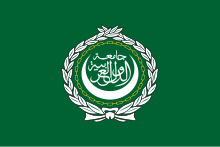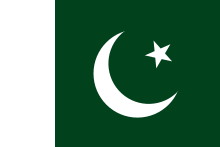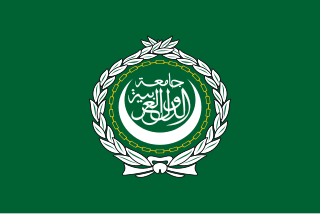

Arab League | Pakistan |
|---|---|
Arab-Pakistan relations refer to foreign relations between Pakistan and the various states of the Arab world which constitute the Arab League.


Arab League | Pakistan |
|---|---|
Arab-Pakistan relations refer to foreign relations between Pakistan and the various states of the Arab world which constitute the Arab League.
Pakistan has a close and strong relationship with the Middle-Eastern region, particularly Saudi Arabia, United Arab Emirates, Syria, Jordan, Yemen, Oman, Qatar, Lebanon, Kuwait, and Iraq . These ties were put to the test when a massive earthquake hit Pakistan's Northern Areas in 2005 with Saudi Arabia & UAE promptly dispatching critical aid, not only in terms of medicine & essential supplies but massive injunction of billions of dollars for the reconstruction of the region. Pakistan also enjoys extensive cultural & defense/military ties with most of the Arab League member states. Pakistan also has extensive trade ties with Arab League states, especially Saudi Arabia and the UAE with Saudi Arabia ranking as Pakistan's second largest trading partner after the United States. [1] With such close association to the Arab League, Pakistan was also invited by Russian President, Vladimir Putin in 2006 to the First Session of the Russia-Islamic World Strategic Vision Group in 2006 in a bid to strengthen Moscow's ties with the big players in the Muslim world.
Army, Naval and Air Force cadets from many of the Arab League countries routinely enroll in training courses in Pakistan's well-recognized military academies while Pakistan Air Force pilots have flown Egyptian, Jordanian, Syrian and Saudi fighter jets in both wars (1967 & 1973 against Israel) & peacetime as part of their 'foreign deployments'. [2] Units from the Pakistan Army, Navy and Air Force also serve allotted time periods in their respective fields in Saudi Arabia and UAE as instructors, maintenance crews, etc. while there are strong indications that a company of Elite Pakistani Commandos, the SSG maintains a permanent unit in Saudi Arabia to safeguard Islam's holiest sites as well as the Saudi Royal Family. Much of the United Arab Emirates Air Force and Army is made up of Pakistani military personnel.
In 2007 Pakistani President, Pervez Musharraf attended the Arab League summit held in Riyadh even though Pakistan had not yet gained 'Observer Member' status. Pakistan is currently in the stages of finalizing a Free Trade Agreement with the GCC countries, many of whom are also part of the Arab League while talks continue to grant Pakistan the 'Observer' status in the coming months. The country also has a history of being an ardent supporter of several Arab causes, including Palestine.

The Arab League, formally the League of Arab States, is a regional organization in the Arab world, which is located in North Africa, West Asia, and part of East Africa. The Arab League was formed in Cairo on 22 March 1945, initially with six members: Egypt, Iraq, Transjordan, Lebanon, Saudi Arabia, and Syria. Yemen joined as a member on 5 May 1945. Currently, the League has 22 members.

The United Arab Emirates, or simply the Emirates, is a country in West Asia, in the Middle East. It is located at the eastern end of the Arabian Peninsula and shares borders with Oman and Saudi Arabia, while also having maritime borders in the Persian Gulf with Qatar and Iran. Abu Dhabi is the nation's capital, while Dubai, the most populous city, is an international hub.

The Cooperation Council for the Arab States of the Gulf, also known as the Gulf Cooperation Council, is a regional, intergovernmental, political, and economic union comprising Bahrain, Kuwait, Oman, Qatar, Saudi Arabia, and the United Arab Emirates. The council's main headquarters is located in Riyadh, the capital of Saudi Arabia. The Charter of the GCC was signed on 25 May 1981, formally establishing the institution.

Arab League–Iran relations refer to the political, economic, and cultural ties between the League of Arab States and the Islamic Republic of Iran. The former is a regional organization composed of 22 Arab states in MENA with a combined majority of Sunni Muslims, whereas the latter is a country in Western Asia with a majority of Shia Muslims.

The Arab League or League of Arab States was founded by Egypt in 1945, has 22 members and seven observer members so far: Armenia, Brazil, Chad, Eritrea, Greece, Republic of India, Venezuela.

The United Arab Emirates has quite a close and friendly relationship with the US, being described as the United States' best counter-terrorism ally in the Gulf by Richard A. Clarke, the U.S. national security advisor and counter-terrorism expert. In terms of defense, the United Arab Emirates Armed Forces has been nicknamed "Little Sparta" by United States Armed Forces generals and former U.S. Secretary of Defense James Mattis for its active role against extremists in the Middle East. The United Arab Emirates also hosts the only United States border preclearance in the Middle East.

Pakistan and Saudi Arabia established relations in 1947. Relations have been historically close and friendly, frequently described by analysts as constituting a special relationship. Pakistan has sometimes been dubbed as "Saudi Arabia's closest Muslim and non-Arab ally." Pakistan has, in line with its pan-Islamic ideology, assumed the role of a guardian of Saudi Arabia against any external or internal threat.

Pakistan–United Arab Emirates relations refer to bilateral relations between the Islamic Republic of Pakistan and the United Arab Emirates . These relations date back to the UAE's formation in 1971, and have since evolved into wide-ranging co-operation in various fields. Pakistan was the first country to extend recognition of the United Arab Emirates, while the UAE has previously been a donor of economic and financial assistance to Pakistan it has happened the other way too. UAE recognizes Pakistan's contribution to the evolution of key institutions in the Emirates while Pakistan recognizes UAE's investment in Pakistan's economy and infrastructure. Both countries' populations share the same faith and are majorly Muslim.

Syria–United Arab Emirates relations refer to the relationship between the United Arab Emirates (UAE) and the Syrian Arab Republic. The UAE has an embassy in Damascus and Syria has an embassy in Abu Dhabi and a consulate-general in Dubai. Both countries are members of the Arab League, part of the Middle East region and share close cultural ties.

Saudi Arabia and the United Arab Emirates (U.A.E.) are neighbouring countries in the Middle East and Persian Gulf region, and share extensive political and cultural ties. Saudi Arabia maintains an embassy in Abu Dhabi and a consulate in Dubai of the U.A.E., while the U.A.E. has an embassy in Riyadh and a consulate in Jeddah, Saudi Arabia.

Pakistan continues to enjoy a privileged status in the Organisation of Islamic Cooperation. In terms of population, it is the OIC's second largest member. Pakistan is the only Muslim country to have detonated nuclear weapons, has the sixth-largest standing military force in the world and a large labour workforce working in various Muslim countries.

Saudi Arabia–Syria relations refer to bilateral and economic relations between Saudi Arabia and the Syrian Arab Republic. Diplomatic ties between these two countries of the Middle East have long been strained by the major events in the region. Saudi Arabia has an embassy in Damascus, and Syria has an embassy in Riyadh. Both countries are members of the Arab League and share close cultural ties.
Pakistan Armed Forces deployments include all Pakistani military deployments that are stationed outside Pakistan and serving in other countries. The sixth largest military power in terms of active troops, Pakistan has an extensive history of overseas military presence, especially in the Middle East, where it has maintained military contingents, missions and battalions in several states. As part of its foreign policy efforts to expand its military relations and influence in the region, Pakistan signed defence protocols during the 1970s with several Arab countries including Saudi Arabia, Libya, Jordan, Iraq, Oman, the United Arab Emirates and Kuwait, under which members of the armed forces of these countries were imparted professional training by Pakistani advisers and military trainers. Saudi Arabia signed a bilateral agreement with Pakistan on defense cooperation; during that time, there were 50,000 to 60,000 Pakistani military personnel serving abroad with the largest number of these, about 20,000, deployed in Saudi Arabia.
Saudi Arabia's involvement in the Syrian Civil War involved the large-scale supply of weapons and ammunition to various rebel groups in Syria during the Syrian Civil War.

The Islamic Military Counter Terrorism Coalition (IMCTC) is an intergovernmental counter-terrorist military alliance between 41 member states in the Muslim world, united around the war against the Islamic State and other counter-terrorist activities. Its creation was first announced by Saudi Arabian defence minister Mohammad bin Salman Al Saud, on 15 December 2015. The alliance was to have a joint operations center in Riyadh, Saudi Arabia.

Iran and Saudi Arabia are engaged in an ongoing struggle for influence in the Middle East and other regions of the Muslim world. The two countries have provided varying degrees of support to opposing sides in nearby conflicts, including the civil wars in Syria and Yemen; and disputes in Bahrain, Lebanon, Qatar, and Iraq. It also extends to disputes or broader competition in other countries globally including in West, North and East Africa, South, Central, Southeast Asia, the Balkans, and the Caucasus.
The Qatar diplomatic crisis was a diplomatic incident in the Middle East that began on 5 June 2017 when Saudi Arabia, the United Arab Emirates, Bahrain and Egypt severed diplomatic relations with Qatar and banned Qatar-registered planes and ships from utilising their airspace, land and sea routes, along with Saudi Arabia blocking Qatar's only land crossing, as a de facto blockade. The crisis ended in January 2021 following a resolution between Saudi Arabia and Qatar.

The Qatar–Saudi Arabia diplomatic conflict refers to the ongoing struggle for regional influence between Qatar and the Kingdom of Saudi Arabia (KSA), both of which are members of the Gulf Cooperation Council (GCC). It is sometimes called the New Arab Cold War. Bilateral relations are especially strained since the beginning of the Arab Spring, that left a power vacuum both states sought to fill, with Qatar being supportive of the revolutionary wave and Saudi Arabia opposing it. Both states are allies of the United States, and have avoided direct conflict with one another.

The Israel–United Arab Emirates normalization agreement, officially the Abraham Accords Peace Agreement: Treaty of Peace, Diplomatic Relations and Full Normalization Between the United Arab Emirates and the State of Israel, was initially agreed to in a joint statement by the United States, Israel and the United Arab Emirates (UAE) on August 13, 2020, officially referred to as the Abraham Accords. The UAE thus became the third Arab country, after Egypt in 1979 and Jordan in 1994, to agree to formally normalize its relationship with Israel, as well as the first Persian Gulf country to do so. Concurrently, Israel agreed to suspend plans for annexing parts of the West Bank. The agreement normalized what had long been informal but robust foreign relations between the two countries. The agreement was signed at the White House on September 15, 2020. It was approved unanimously by the Israeli cabinet on October 12 and was ratified by the Knesset on October 15. The UAE parliament and cabinet ratified the agreement on October 19.
The Arab–Israeli normalization refers to the peace efforts and treaties between the member states of the Arab League and Israel, ending the Arab–Israeli conflict. Since the 1970s, there has been a parallel effort made to find terms upon which peace can be agreed to in the Arab–Israeli conflict and also specifically the Israeli–Palestinian conflict. Over the years numerous Arab League countries have signed peace and normalization treaties with Israel, beginning with the Egypt–Israel peace treaty (1979). Despite the failure to implement the Israeli-Lebanese peace accords (1983), more treaties continued with the Israeli-Palestinian peace process (1991-present), the Jordan–Israel peace treaty (1994), the Abraham Accords normalizing relations between Israel-United Arab Emirates and Israel-Bahrain (2020), the Israel–Sudan normalization agreement (2020) and the Israel–Morocco normalization agreement (2020). Moreover, numerous Arab League members established semi-official relations with Israel.